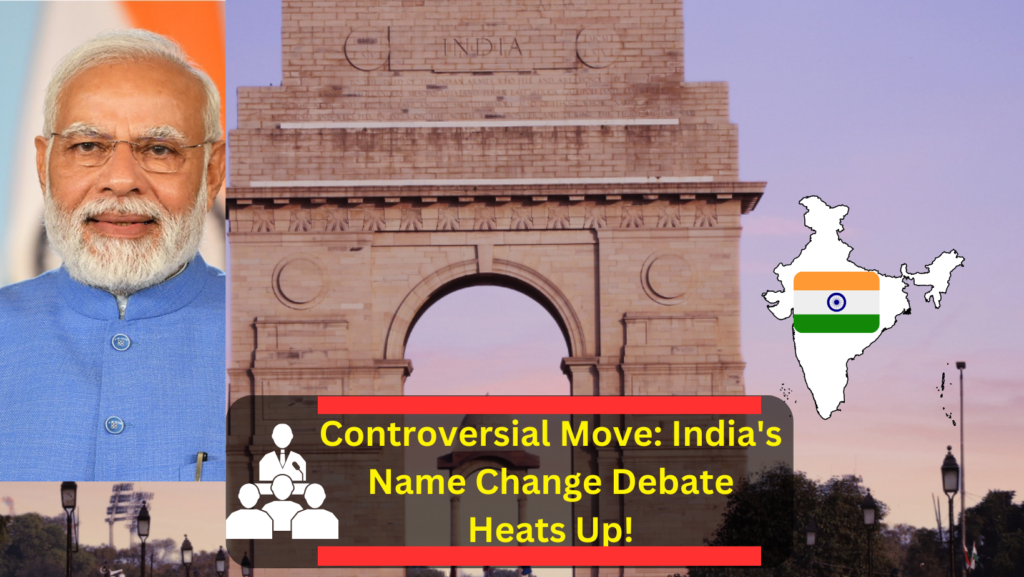The decision to use “President of Bharat” instead of the traditional “President of India” on official G20 Summit invitations has ignited a significant debate within the country. This move, which coincides with the upcoming special parliamentary session, has set the political landscape ablaze.

Furthermore, “Bharat” has been prominently featured in a G20 booklet created for foreign delegates, titled “Bharat, The Mother Of Democracy.” The booklet asserts that “Bharat” is the official name of the country, as enshrined in the Constitution and documented during the discussions of 1946-48. This transition in nomenclature is particularly noteworthy as India prepares to host prominent world leaders, including US President Joe Biden and UK Prime Minister Rishi Sunak.
7 Key points on renaming INDIA to BHARAT
- The decision to use “President of Bharat” on G20 Summit invitations has stirred political controversy in India.
- A G20 booklet for foreign delegates titled “Bharat, The Mother Of Democracy” highlights that “Bharat” is the country’s official name, as established in the Constitution.
- This shift in nomenclature coincides with India’s preparation to host world leaders like Joe Biden and Rishi Sunak.
- The BJP government may propose a resolution to change the country’s name during an upcoming special parliamentary session.
- Opposition parties criticize the move as “distorting history and dividing India,” while BJP leaders welcome it as a statement against a colonial mindset.
- The RSS chief, the BJP’s ideological mentor, also suggested adopting “Bharat” over “India.”
- The debate surrounding the name change reflects the complexity of national identity and its significance in India’s political landscape.
The adoption of “Bharat” in official documents isn’t limited to international invitations. BJP spokesperson Sambit Patra recently shared a document related to the Prime Minister’s visit to Indonesia, referring to him as the “Prime Minister of Bharat.”
Sources suggest that the government may propose a resolution to officially change the country’s name during the upcoming five-day special parliamentary session commencing on September 18. The absence of a disclosed agenda for this session has only fueled speculation about the government’s intentions.
Unsurprisingly, the move has garnered sharp criticism from the Opposition, particularly from members of the “INDIA bloc.” They accuse the Narendra Modi government of “distorting history and dividing India.” Congress Chief Mallikarjun Kharge has called for a meeting of senior alliance leaders to address this issue. Opposition leaders have even drawn parallels between this move and their own alliance, with AAP chief Arvind Kejriwal questioning whether the ruling party would rename the country “BJP” if the Opposition alliance decided to call itself “Bharat.”
Nationalist Congress Party chief Sharad Pawar vehemently opposed the idea, asserting that no one has the right to change the country’s name. He questioned the ruling party’s concern over a name (INDIA bloc) associated with the country.
In contrast, BJP leaders have welcomed the use of “Bharat” in official documents and accused the Opposition of being anti-national and anti-constitutional. They point out that the term “Bharat” is already included in Article 1 of the Constitution, which reads, “India, that is Bharat, shall be a Union of States.”
Union Minister Dharmendra Pradhan expressed his satisfaction with the decision, considering it a bold statement against the colonial mindset. He emphasized that “Bharat” is an integral part of their identity, and they take pride in it. He also commended the President for prioritizing the use of “Bharat.”
It’s interesting that this dispute started right after the ideological guru of the BJP, the head of the Rashtriya Swayamsevak Sangh (RSS), advised that the nation should change its name from “India” to “Bharat.” “We must stop using the word India and start using Bharat,” said RSS leader Mohan Bhagwat. No matter where you go in the world, the name of the nation Bharat will always be Bharat. Both orally and in writing, one must mention “Bharat.”
The intense disputes sparked by this change in terminology are a reflection of the intricacy of national identity and its symbolism in India’s dynamic political environment.
